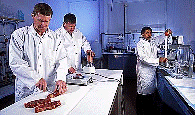U.S. Department of Agriculture: Agricultural Research Service, Lincoln, Nebraska
Date of this Version
2003
Document Type
Article
Citation
Outlook on AGRICULTURE Vol 32, No 4, 2003, pp 253–265
Abstract
The science of genome research in livestock has been the focus of substantial worldwide efforts over the last decade, resulting in the development of a genetic map for cattle and its use to identify chromosomal segments carrying genes affecting production traits. Variations in individual genes having a major impact on phenotypes in cattle, such as alleles causing double-muscling and black/red coat colour, have been identified in the process, but the majority of the loci remain unknown except for their approximate position in the cattle genome and the relative impact of variation on the trait. Approaches to fulfil the promise of genome research, resulting in DNA-based tests of genetic merit for important production traits, have been slow to develop. In this article, the authors review the theory of genome-based approaches and potential avenues of application. Application to meat quality and value is specifically discussed, but the general principles are similar for production traits such as reproduction and animal health. A substantial amount of the discussion centres on describing practical limitations on the use of genomic data and the currently available avenues for application, aspects that have previously received inadequate attention.


Comments
U.S. Government Work